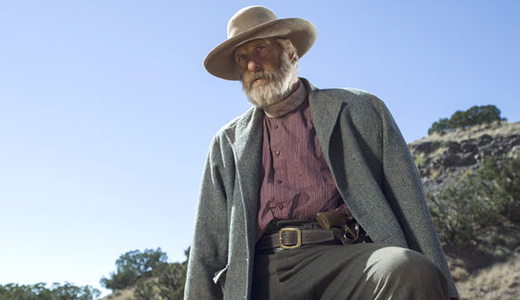We’re three whole days into 2018 now, but it’s still wholly appropriate to look back at the year that was. Researchers have weighed the data to determine the year’s most popular books, movies and videos. Pundits have opined on the year’s biggest entertainment stories. But one thing’s clear, at least to the Los Angeles Times’ Jeffrey Fleishman: It was a banner year for the bad guys.
Fleishman singles out a few of them: The Scripture-quoting Frank Griffin from Netflix’s Godless; the racist cop Dixon in Three Billboards Outside Ebbing, Missouri; the Colonel in War for the Planet of the Apes, to namecheck a few. He suggests their power is a product of a polarized society and our own societal wrestling with the day’s big social justice issues:
The villain resides in our imaginations like a piece of darkness, rousing the hushed things deep within, part human, part something we’d rather not contemplate. We revel in their cunning, recoil at their perniciousness and bloodlust. They are fallen angels who hold our fears and weaknesses to the light, coaxing us into accepting their vileness or granting them a measure of understanding.
Granted, not all villains are so sympathetic. It’d be a rare (and rather disturbed) person indeed who would grant IT’s Pennywise the Clown a “measure of understanding.” But Pennywise was arguably the year’s most influential villain. Indeed, thanks to IT’s popularity (the film made $327.5 million in North America), the horror genre has gone from marginalized to mainstream.
Not everyone is thrilled with this cultural turn to the Dark Side, though. Take, for instance, Mark Hamill, who was originally none-too-pleased that his iconic good-guy character, Luke Skywalker, seemed a bit jaded and discouraged in Star Wars: The Last Jedi—and he said as much before the movie was released. Now that the movie’s out, though, Hamill says he was wrong to voice his “doubts and insecurities.” “All I wanted was to make a good movie,” he wrote on Twitter. “I got more than that—[director Rian Johnson] made an all-time GREAT one!” (Hear that, you Jedi naysayers? Luke Skywalker agrees with me!)
(Oh, and while we’re on the subject of Star Wars—and possibly of pop culture villains—Star Wars creator George Lucas says that he may have gone “too far in a few places” in The Phantom Menace.)
Another star is apologizing for going a bit too far this week. Popular YouTube personality Logan Paul took a trip to a Japanese forest notorious for being the site of dozens of suicides—taking a camera crew along, naturally. Sure enough, he came across an apparent suicide victim, recorded it and posted it on his YouTube channel. The backlash was swift and severe. And after Logan first attempted to justify the video as a way to raise awareness for suicide prevention, the YouTube star pulled the video altogether and posted an apology on Twitter. “I’m often reminded of how big of a reach I truly have & with great power comes great responsibility … for the first time in my life I’m regretful to say I handled that power incorrectly,” he wrote. “It won’t happen again.”
Speaking of apologies, Paul Stark is looking for one, too from his favorite professional football team. According to the 80-year-old’s obituary in the Sandusky Register, Stark died after a brief illness that was “exacerbated by the hopeless condition of the Cleveland Browns,” who finished 0-16 this year. Here’s to hoping the organization at least sent flowers.
The new year is obviously a popular time for making resolutions, of course. (I, for instance, have resolved to stop using so many puns in my Monday movie blogs.) But as lots of us commit to cutting back on sweets and exercising more, several experts suggest that we—or our kids—could use a digital or social media diet. Oh, and the World Health Organization thinks that we really, really should cut back on our gaming: It’s getting ready to classify “gaming disorder” as an official health problem.
Meanwhile, Nintendo hopes to sell 50 million Switches by 2019. Hmmm.
The turn of the new year doesn’t just mean saying hello to another calendar: It means saying goodbye to some folks, too. And we lost plenty in 2017, from Mary Tyler Moore to Bill Paxton to Tom Petty. But 9-year-old Brian McGilloway was particularly upset about losing his favorite Doctor in Doctor Who—Peter Capaldi, who stepped aside to make room for Jodie Whittaker in Britain’s long-running sci-fi series. (The show has been running since the 1960s, more or less, and by necessity “The Doctor” regenerates on occasion.)
Well, Capaldi wrote a personal, handwritten letter to his despondent fan. “The new doctor always becomes your favorite and the one that goes… well, he never really goes, he is always there, somewhere in time and space, and if you think about him hard enough you’ll see him, and he’ll see you,” Capaldi wrote. “It’s like the Doctor says, ‘Everything ends and it’s always sad. But everything begins again, and that’s always happy. Be happy.’”
On the dawn of a new year—a new beginning, if you will—seems like good advice.






Recent Comments